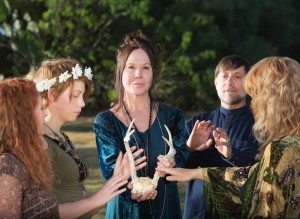 There is lots of confusion and misinformation about the difference between Wicca and Witchcraft. The most simple understanding is that Wicca is a religion while Witchcraft is a practice. However, many dispute this simple distinction. They also argue that it merely raises the further question of the difference between a religion and a practice.
There is lots of confusion and misinformation about the difference between Wicca and Witchcraft. The most simple understanding is that Wicca is a religion while Witchcraft is a practice. However, many dispute this simple distinction. They also argue that it merely raises the further question of the difference between a religion and a practice.
It may be that we understand “religion” as defined as “a cause, principle, or system of beliefs held to with ardor and faith”, such as Christianity or Islam, and therefore, Wicca.
A “practice”, on the other hand, is a set of rituals and customs. This would include activities, such as prayer and meditation, and even Witchcraft.
That’s good for starters, now let’s go into more detail and show that Wicca and Witchcraft are not the same thing.
What is Wicca?
First of all, what is Wicca?
Wicca is a denomination of Paganism, whereas magic and spells ought to be recognized as the domain of Witchcraft. Since its introduction in England by Gerald Gardner in the 1950s, Wicca has taken on many new forms and practices as it’s spread throughout Europe and North America.
Wicca includes the performance of magic and ritual and the worship of deities. This includes to honour the Lord and Lady, observe the turns of the Wheel of the Year and more. Although it is considered a nature religion by many, it is notably popular among city dwellers.
What is Witchcraft?
So now we have some understanding of Wicca, what is Witchcraft?
Witchcraft is often traced back as far as the European Middle Ages, however, there is evidence of Witchcraft in different places and times. The terms Witchcraft and Witch were originally used by Christians to describe people who worked with magic and were not terms adopted by Witches themselves until later.
Since Witchcraft is mostly considered a practice rather than a religion, one can be a witch while simultaneously being a member of a religion, such as Christianity. Although, it is worth noting that many religions have strong convictions on the morality, or rather, immorality of Witchcraft.
Many Witches consider Witchcraft more than a practice and define it as a religion too. And while some Witches believe that magic can be performed without the assistance of the divine, but instead, from within oneself or nature. On the other hand, other Witches claim that the divine is essential to cast spells.
Magic
If we consider the earlier distinction between religion and practice, what is the role of magic in this? Magic, the primary pursuit of Witchcraft, is a practice whereas Paganism, of which Wicca is considered a subgroup, is a religion.
So, is it possible to practice magic if you are not a Witch?
Of course. Magic comes in many forms and it’s also a feature of many major religions. For instance, in a sense prayer is a type of magic.
Intention
One of the significant differences between Wicca and Witchcraft is one of intention. The intention of Wicca is to concentrate on the quest for spirituality and one’s connection to the divine. According to Wicca, the divine appears to us in many forms and faces.
On the other hand, Witchcraft does not necessarily include any conception of the divine.
It is primarily concerned with the use of magic and spells. Another key element of Witchcraft is the use of herbs and natural occurring ingredients to achieve desired goals. The goals of Witchcraft can vary as wide as healing or love.
The Afterlife
Wicca and Witchcraft hold different beliefs about the afterlife. Wiccans believe in reincarnation whereas this is not a belief held in all forms of Witchcraft. This is because, while Witchcraft has traditional roots in Europe, the belief in reincarnation is an example of how ideas have been adopted by Wicca from Eastern philosophies and religions, notably Buddhism and Hinduism.
Witches, in contrast, believe that after death the person returns to nature and the earth and becomes a spirit of the land. Some Witches believe there is a period before this in which the person travels through the Spirit world before becoming a spirit of the land.
Is a Wiccan a Witch?
Part of the confusion between Wicca and Witchcraft is due to the relative openness of Wiccans and other followers of Paganism towards the world of magic and spells. Because of this Wiccans are more likely to be attracted to Witchcraft.
There are Wiccans who contend that Wiccans are all Witches. This is also disputed by many Wiccans who deny that they are Witches. They argue that they do not engage in magic or spells. However, it should be said that many Wiccans find themselves eventually attracted to Witchcraft.
Many Wiccans do not practice magic or spells at all. Instead, they are more focused on spirituality and their personal relationship to the divine.
However, as it may already be apparent, there are no clear lines.
Wicca is often defined as a subgroup of Witchcraft. Gardner titled his books “Witchcraft Today” (1954) and “The Meaning of Witchcraft” (1959). He doesn’t even mention the term Wicca.
Therefore, it could be argued that Witchcraft has a loose definition and incorporates a wide range of practices and beliefs, including that of Wicca. However, simply put, not all Wiccans are Witches, and nor are all Witches are Wiccans.
Final Thoughts on Wicca and Witchcraft”
It is understandable to be confused about the differences between Wicca and Witchcraft. Many books and articles use Wicca and Witchcraft, as well as, Wiccans and Witches as univeralable and interchangeable. However, as this article has made clear, they are certainly not the same thing.
As Wicca and Witchcraft gain in popularity, perhaps an understanding of the differences between the two will be more widely known.
If you have any further questions about the Wicca and Witchcraft please leave a comment below. If you would like to read more about Wicca, Witchcraft or another topic, please see our blog. Alternatively, you can Chat and more.

Speak Your Mind